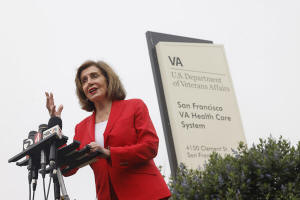VA hospitals are finding it harder to fill jobs, watchdog says
[August 13, 2025]
By BEN FINLEY
NORFOLK, Va. (AP) — Government-run medical centers serving the nation's
veterans have reported an increase in severe staffing shortages, with
many hospitals having trouble filling jobs for doctors, nurses and
psychologists, according to an independent watchdog for the Department
of Veterans Affairs.
Tuesday's report from the VA's Office of Inspector General is based on
surveys from late March and early April that were taken at 139 Veterans
Health Administration facilities. Severe staffing shortages are not
necessarily an indication of vacancies but refer to particular
occupations that are difficult to fill.
The surveys were taken just weeks after it was reported in early March
that the VA had planned to cut 80,000 jobs — out of 484,000 — through
the so-called Department of Government Efficiency, known as DOGE. The VA
later reduced the figure to nearly 30,000 jobs to be cut by this fiscal
year’s end on Sept. 30.
President Donald Trump's administration said Tuesday that the surveys
are unreliable because they do not reflect actual vacancies, which VA
officials said were in line with historical averages. But Democratic
lawmakers warned that veterans won't get the health care they need as VA
positions become harder to fill.
The surveys reflected a 50% increase in the reporting of severe staffing
shortages for specific jobs, both for clinical occupations that include
doctors and psychologists and for non-clinical jobs that include police
and custodial workers.

Nearly all of the facilities — 94% — reported a shortage for medical
officer occupations that include doctors, while 79% reported shortages
for nurses. The report noted that severe shortages for medical officers
and nurses have been identified every year in the report since 2014.
Pete Kasperowicz, the VA's press secretary, stressed in an email that
the report is not based on vacancies and is therefore “not a reliable
indicator of staffing shortages.”
“The report simply lists occupations facilities feel are difficult for
which to recruit and retain, so the results are completely subjective,
not standardized and unreliable,” Kasperowicz wrote.
He said that vacancy rates for doctors and nurses are 14% and 10%,
respectively, which he said are lower than most other health care
systems and in line with “normal VA historical averages.”
[to top of second column]
|

Democratic Rep. Nancy Pelosi speaks on the corner of Clement Street
and 42nd Avenue after touring the San Francisco VA Medical Center
and meeting VA officials to mark House Democrats' Honor Our Veterans
Day of Action on Thursday, Aug. 7, 2025, in San Francisco. (Lea
Suzuki/San Francisco Chronicle via AP)
 But Jacqueline Simon, policy
director for the American Federation of Government Employees, said
the surveys reflect the Trump administration's profound hostility
toward the federal workforce and what she said are its plans to
ultimately privatize the VA.
“This is a deliberate effort to incapacitate and to undermine
veterans' support for and approval of the care they receive in VA
hospitals and clinics,” Simon said. “They’ll have to wait much
longer for appointments. There won’t be specialists available.
They’ll have no choice but to go to the private sector.”
Simon also noted the VA’s announcement last week that it was
terminating collective bargaining agreements for most VA
bargaining-unit employees, which could further hurt recruitment.
The VA said in a news release that the move will “make it easier for
VA leaders to promote high-performing employees, hold poor
performers accountable, and improve benefits and services to
America’s Veterans.”
But U.S. Sen. Mark Warner said in a news release Tuesday that the
Trump administration has made it harder for public servants to do
their jobs “and ultimately harder for veterans to get the care
they’ve earned.”
“We also know from recent jobs reports that applications to work at
the VA are plummeting," said Warner, a Democrat who represents the
veteran-dense state of Virginia. “How do skyrocketing staffing
shortages and declining applicant pools make it more ‘efficient’ for
veterans to access the care and services they deserve? The answer
is: they don’t.”
All contents © copyright 2025 Associated Press. All rights reserved
 |